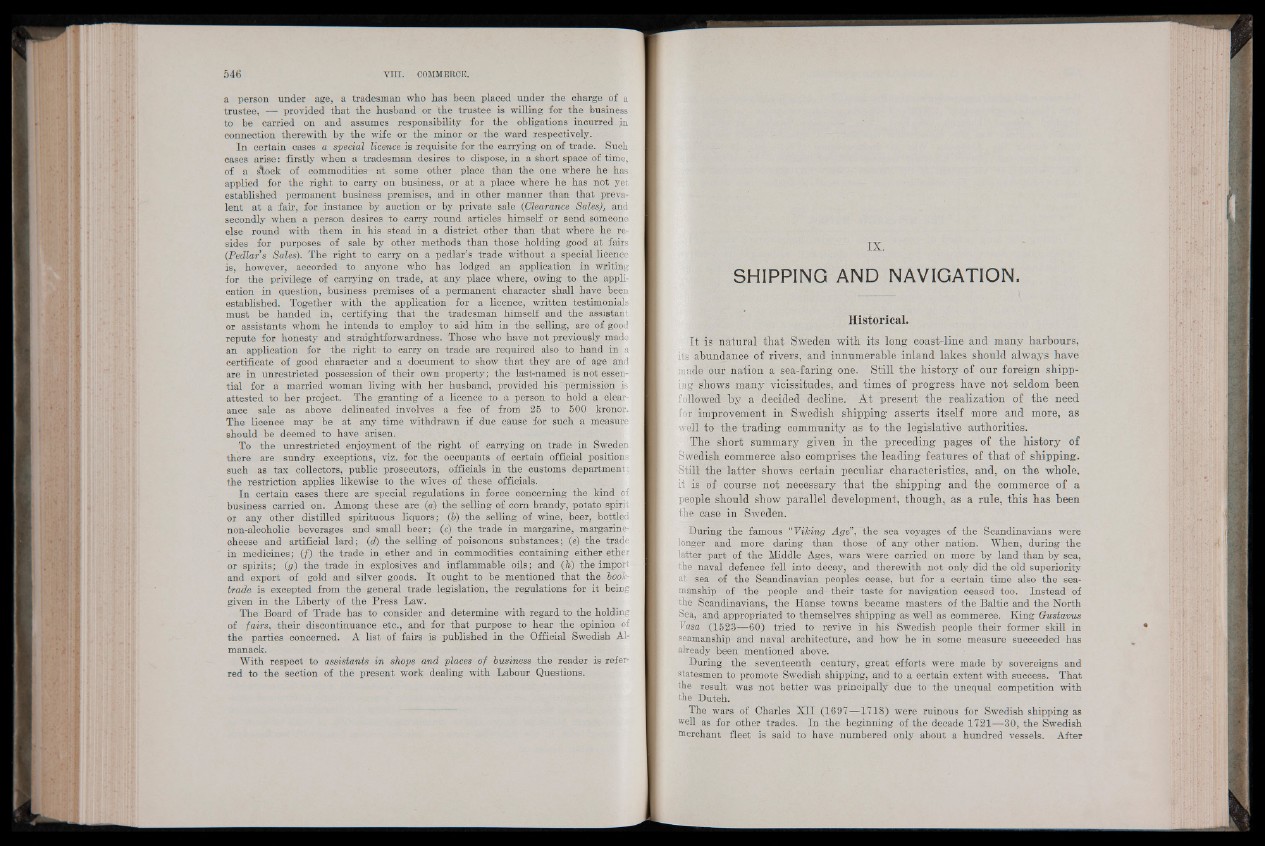
a person under age, a tradesman who has been placed under the charge of a
trustee, — provided that the husband or the trustee is willing for the business
to be carried on and assumes responsibility for the obligations incurred in
connection therewith by the wife or the minor or the ward respectively.
In certain eases a special licence is requisite for the carrying on of trade. Such
cases arise: firstly when a tradesman desires to dispose, in a short space of time,
of a slock of commodities at some other place than the one where he has
applied for the right to carry on business, or at a place where he has not yet
established permanent business premises, and in other manner than th a t prevalent
at a fair, for instance by auction or by private sale (Clearance Sales), and
secondly when a person desires to carry round articles himself or send someone
else round with them in his stead in a district other than that where he resides
for purposes of sale by other methods than those holding good at fairs
(Pedlar s Sales). The right to carry on a pedlar’s trade without a special licence
is, however, accorded to anyone who has lodged an application in writing
for the privilege of carrying on trade, at any place where, owing to the application
in question, business premises of a permanent character shall have been
established. Together with the application for a licence, written testimonials
must be handed in, certifying that the tradesman himself and the assistant
or assistants whom he intends to employ to aid him in the selling, are of good
repute for honesty and straightforwardness. Those who have not previously made
an application for the right to carry on trade are required also to hand in a
certificate of good character and a document to show that they are of age and
are in unrestricted possession of their own property; the last-named is not essential
for a married woman living with her husband, provided his permission is
attested to her project. The granting of a licence to a person to hold a clearance
sale as above delineated involves a fef of from 25 to 500 kronor.
The licence may be at any time withdrawn if due cause for such a measure
should be deemed to have arisen.
To the unrestricted enjoyment of the right of carrying on trade in Sweden
there are sundry exceptions, viz. for the occupants of certain official positions
such as tax collectors, public prosecutors, officials in the customs department;
the restriction applies likewise to the wives of these officials.
In certain cases there are special regulations in force concerning the kindfef
business carried on. Among these are (a) the selling of com brandy, potato spirit'
or any other distilled spirituous liquors; (6) the selling of wine, beer, bottled
non-alcoholic beverages and small beer; (c) the trade in margarine, margarine-
cheese and artificial lard; (d) the selling of poisonous substances; (e) the trade
in medicines; (f) the trade in ether and in commodities containing either ether
or spirits; (g) the trade in explosives and inflammable oils; and (A) the import
and export of gold and silver goods. I t ought to be mentioned that the book-
trade is excepted from the general trade legislation, the regulations for it being
given in the Liberty of the Press Law.
The Board of Trade has to consider and determine with regard to the holding
of fairs, their discontinuance etc., and for that purpose to hear the opinion |>of
the parties concerned. A list of fairs is published in the Official Swedish Almanack.
With respect to assistants in shops and places of business the reader is referred
to the section of the present work dealing with Labour Questions.
IX.
SHIPPING AND NAVIGATION.
Historical.
It is natural;'that Sweden with its long coast-line and many harbours,
its abundance of rivers, and innumerable inland lakes should always have
made our nation a sea-faring one. Still the history of our foreign shipping
shows many vicissitudes, and times of progress have not seldom been
followed by a decided decline. At present the realization of the need
forj improvement in Swedish shipping asserts itself more and more, as
well to the trading community as to the legislative authorities.
The short summary given in the preceding pages of the history of
Swedish commerce also comprises the leading features of that of shipping.
Still the latter shows certain peculiar characteristics, and, on the whole,
it is of course not necessary that the shipping and the commerce of a
people should show parallel development, though, as a rule, this has been
the case in Sweden.
During the famous “Viking Ape”, the sea voyages of the Scandinavians were
longer and more daring than those of any other nation. When, during the
latter part of the Middle Ages, wars were carried on more by land than by sea,
the naval defence fell into decay, and therewith not only did the old superiority
at sea of the Scandinavian peoples cease, but for a certain time also the seamanship
of the people and- their taste for navigation ceased too. Instead of
the Scandinavians, the Hanse towns became masters of the Baltic and the North
Sea, and appropriated to themselves shipping as well as commerce. King Gustavus
Vasa '(15238 -601 tried to revive in his Swedish people their former skill in
seamanship and naval architecture, and how he in some measure succeeded has
already been mentioned above.
During the seventeenth century, great efforts were made by sovereigns and
statesmen to promote Swedish shipping, and to a certain extent with success. That
the result was not better was principally due to the unequal competition with
the Dutch.
The wars of Charles XII (1697—1718) were ruinous for Swedish shipping as
well as for other trades. In the beginning of the decade 1721—80, the Swedish
merchant fleet is said to have numbered only about a hundred vessels. After